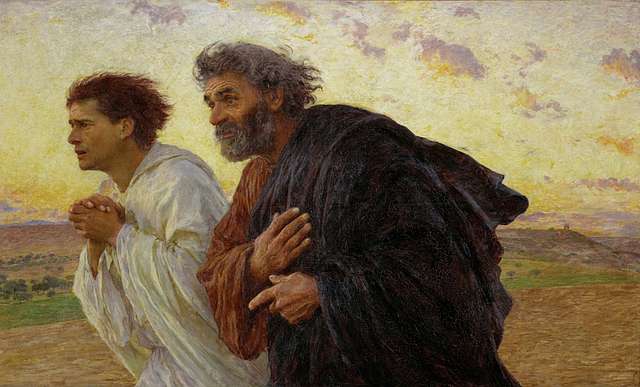From the responsorial psalm: “Give thanks to the LORD, for he is good, for his mercy endures forever. Let the house of Israel say, ‘His mercy endures forever.’ This is the day the Lord has made; let us rejoice and be glad.”
A reading from the holy Gospel according to John (Jn 20:1-9, today’s readings).
When Simon Peter arrived after him, he went into the tomb and saw the burial cloths there, and the cloth that had covered his head, not with the burial cloths but rolled up in a separate place. Then the other disciple also went in, the one who had arrived at the tomb first, and he saw and believed. For they did not yet understand the Scripture that he had to rise from the dead.
While it was still dark, Mary Magdala goes to the tomb on Sunday, the day after the sabbath, to find the stone removed. Immediately going to Peter, she tells him that Jesus has been taken and she doesn’t know where they put him. Neither Peter nor Mary yet understand what has taken place. Both Peter and John run to the tomb. Although John is faster than Peter, he waits for Peter to arrive to go into the tomb. At first Peter enters and then John, finding the burial cloths. John notes how the burial cloth that covered Jesus’ head was rolled up in a separate place, a realization that sweeps into an overwhelming recognition that Jesus has risen from the dead. John himself testifies to this. The empty tomb, the resurrection of Jesus, is the fulfillment of scripture and the culmination of every promise of God’s mercy. We hear Saint Paul say in the second reading: “When Christ your life appears, then you too will appear with him in glory.” Glory to you, Lord, Christ is risen!”
Glory and praise to you, Father in heaven. Your only begotten Son has triumphed over sin and death and remains with us, the risen Christ, reconciling us to you. The hymn before the Gospel proclaims, “Christians, to the Paschal Victim Offer your thankful praises . . . ! Yes, Christ my hope is arisen.” Give me the grace, Lord, to rest in Christ in the joy of the feast. Let me realize alongside Paul that I have died and my life is hidden with Christ in you. “I shall not die, but live, and declare the works of the LORD. This is the day the Lord has made; let us rejoice and be glad.”
Glory be to the Father, and to the Son, and to the Holy Spirit, as it was in the beginning, is now, and ever shall be, world without end. Amen.

